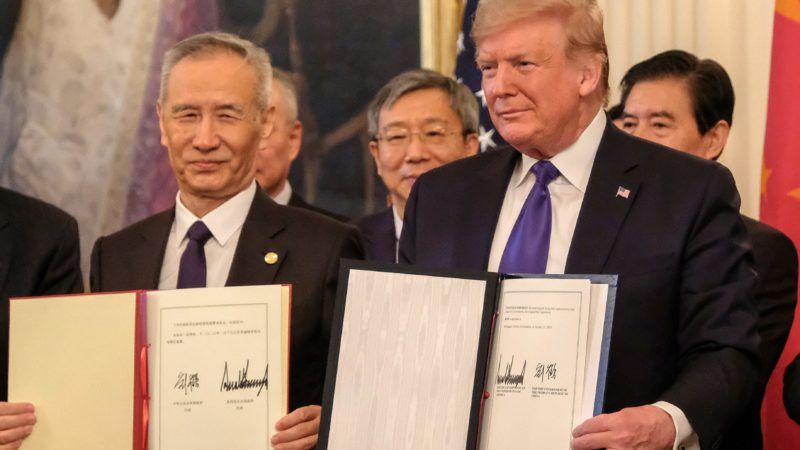Trump's Agriculture Department Just Called Bull on a Key Part of His China Trade Deal
Instead of $12.5 billion in new agriculture purchases exports to China this year, the USDA expects less than $4 billion.

When he inked a so-called "phase one" trade deal with China last month, President Donald Trump touted it as a major win for American farmers. It would be so great, he said, that farmers would have to buy "more land" and "bigger tractors."
As part of the deal, China agreed to buy $40 billion worth of agricultural goods annually, an increase of about $16 billion over the pre-trade war baseline, with $12.5 billion of that increase coming this year. Now, new projections released by the U.S. Department of Agriculture (USDA) suggest China will buy less than a third of that promised increase.
This should not be a surprise to anyone except the president. Even before the deal was signed, economists were questioning whether China's promised farm purchases were realistic. Chad Brown, a senior fellow at the Peterson Institute for International Economics, a trade-focused think tank, wrote that the export targets set by the phase one agreement were so "unrealistic" that the entire deal could be in jeopardy.
After all, the record value for all American farm exports to China in a single year is about $26 billion, set in 2012. If you include fish and forestry products, that record total rises to $29 billion. Even if China bought all American exports of corn, soybeans, wheat, and pork, and the total would barely exceed $50 billion a year.
Like so much else about the trade war, the promised "win" for American farmers had more to do with politics than economics. The deal with China was never about settling any of the underlying economic issues between the two countries. But it lets Trump talk about how he stood up to China as he runs for reelection.
"The deal is structured so that the evidence of shortfalls in those Chinese purchase pledges won't be clear until after the presidential election in November 2020," Brown noted last month. That's not an accident.
Now even Trump's own Agriculture Department is disputing the president's numbers. The agency is projecting a $3.9 billion increase in agricultural exports to China this year, Bloomberg reports. The one caveat is that the new projections look only at the current federal fiscal year—which ends on September 30—leaving open the slim possibility that China could hike purchases by a whopping $10 billion during this year's final quarter.
The increasingly unavoidable conclusion is that Trump greatly exaggerated the extent to which his deal would make up for the pain farmers have suffered during the trade war. On Friday morning, Trump seemed to cop to that reality by tweeting out a promise to continue bailing out farms if China's agriculture purchases don't meet expectations.
IF OUR FORMALLY TARGETED FARMERS NEED ADDITIONAL AID UNTIL SUCH TIME AS THE TRADE DEALS WITH CHINA, MEXICO, CANADA AND OTHERS FULLY KICK IN, THAT AID WILL BE PROVIDED BY THE FEDERAL GOVERNMENT, PAID FOR OUT OF THE MASSIVE TARIFF MONEY COMING INTO THE USA!
— Donald J. Trump (@realDonaldTrump) February 21, 2020
It should go without saying that "tariff money coming into the USA" is coming out of the pockets of American consumers, manufacturers, and farmers, because that's how tariffs work.
All of this matters for two reasons. First, politically, Trump may have cost himself a smaller victory by promising a bigger one. China is still going to increase farm purchases by nearly $4 billion, if the feds' projections are correct. That's a big number! But Trump's seemingly uncontrollable urge to self-aggrandize now puts him in the position of having to explain why his deal has not lived up to expectations.
Second, China's inability to meet those unrealistic demands could give the White House a warped rationale for reigniting hostilities if Trump wins reelection. It's not at all difficult to imagine Trump, or economic advisors like Peter Navarro, pointing to slower-than-expected growth in farm exports to China as proof that Beijing has not held up its end of the bargain and then using that to justify more tariffs or other counterproductive strategies.
"With unrealistic export targets, the deal may be doomed from the start," Brown warned last month. "Even worse, hostilities might renew, leading to a re-escalation of trade tensions currently on hold."
Trump told farmers he was delivering a big win. Instead, they might get more of the same.


Show Comments (50)